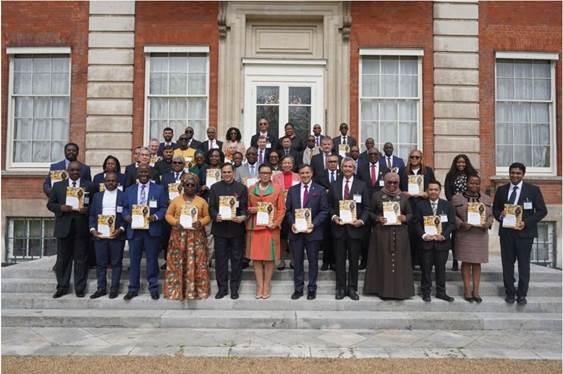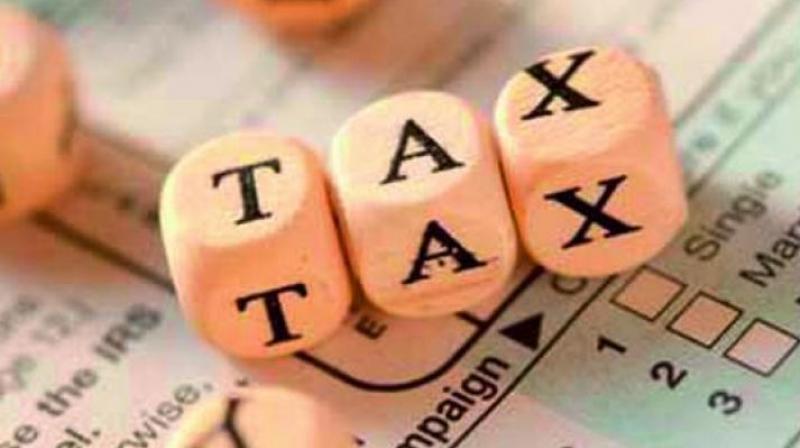India’s CPGRAMS recognized as the best practice by Commonwealth Secretariat
Author: BI Bureau

New Delhi: The Commonwealth Secretariat has recognized Centralised Public Grievance Redress and Monitoring System(CPGRAMS) of India as the best practice in Commonwealth Secretaries of Public Service/ Secretaries to Cabinet meeting that took place from 22 to 24 April, 2024 in Marlborough House, London. In the outcome statement of Third Biennial Pan-Commonwealth Heads of Public Service Meeting issued on 24.04.2024, the commonwealth Secretariat Shared with member countries the Centralised Public Grievance Redress and Monitoring System (CPGRAMS) of India, the Civil Registration and Vital Statistics System (CVRS) and identity management systems of Namibia, Human Resource Management and E-Citizen models of Kenya as future-ready governance best practices from across the Commonwealth.
The Indian presentation on the Centralized Public Grievance Redress and Monitoring System (CPGRAMS) was made by V. Srinivas, Secretary, Department of Administrative Reforms and Public Grievances (DARPG), on April 23, 2024 and received commendation from Commonwealth Member countries as a global best practice. The Secretary General of the Commonwealth, Patricia Scotland KC said "CPGRAMS is a state-of-the-art grievance redressal system and a best practice of SMART government. The Commonwealth’s remaining 1.2 billion citizens can benefit from the adoption of the technology platform in the same way India’s 1.4 billion citizens have benefited."
The theme of the meeting was ‘Institutionalisation of SMART Government to enhance public service delivery’ with focus on adopting AI in governance. The forum brought together Commonwealth Heads of Public Service, Secretaries to Cabinet, Senior Public Officials, industry champions, and eminent scholars.
The primary objectives of the meeting were to share contemporary knowledge, ideas and experiences on how technology could be leveraged to support provision of e-services for optimal service delivery and achievement of the 2030 Agenda for Sustainable Development across the Commonwealth. It also aimed at sharing select relevant case studies of some member countries and to identify opportunities for possible partnership and collaboration.
The meeting was addressed by Tshering Tobgay, Prime Minister of the Royal Kingdom of Bhutan and Patricia Scotland KC, Commonwealth Secretary-General.
It was observed that there is currently greater appreciation of the importance of digital government, which has added impetus on the roll out of e-services across many jurisdictions. Indeed, there is notable improvement in the way that public services are being delivered, through reliance on secure, inclusive and sustainable information and communication technologies that are data-driven and performance-focused initiatives to strongly move ahead towards digital empowerment of citizens and digital transformation of institutions.
Delegates appreciated the papers and country studies presented by the delegates from Rwanda, Kenya, India and Namibia, and noted that the forum remains an important platform for networking and for sharing knowledge, expertise and ideas on public service management.
Member countries affirmed the CHOGM mandate that seeks to eliminate the digital divide and acknowledged the importance of transformative technologies, such as Artificial Intelligence (AI). Member Countries also noted that AI has potential for future-ready governance institutions and agile governments to enhance efficiency to deliver the Sustainable Development Goals (SDGs), and spur growth and development, by in particular, improving access to education, healthcare, clean water, energy, and to combat climate change, poverty, and hunger. They also welcomed the work of the Commonwealth Artificial Intelligence Consortium (CAIC), which is providing critical leadership across policy, capacity building, research and innovation, data and infrastructure domains, for the adoption of AI across the Commonwealth, especially in Small States.
Member countries also identified the AI Consortium as the platform to lead the way in capacity development work on SMART government to be effectively used for efficient redress of public grievances, improving service delivery, strengthening integrity systems and ushering in procurement reforms.
The meeting was briefed about the Commonwealth Hub for the Business of Government whose aim is to support capacity building initiatives for governments to deliver better, faster, and cheaper public services, create knowledge sharing networks on various aspects of implementation, promote good governance and facilitate achievement of the 2030 Agenda for Sustainable Development.
Member countries hailed the impact of technology on strengthening the justice systems and acknowledged the important role that small claim courts are playing in easing access to justice across many Commonwealth jurisdictions. Member countries received a report on the importance of sustainable funding for technical assistance.
Delegates acknowledged the work the Secretariat has undertaken in strengthening integrity systems in the Commonwealth and stressed theimportance of transparency and accountability in public institutions. The meeting received a report on the importance of sustainable funding for technical assistance.
The meeting agreed and endorsed the following actions:
a) Creation of a community of practice for Commonwealth Heads of Public Service to enhance sharing of knowledge and experiences. Delegates welcomed the opportunity for continued dialogue on topics of good governance during the interregnum between biennial meetings.
b) Conducting a stocktaking exercise on the status of smart governance within the Commonwealth countries and to identify both the success stories as well as the gaps/demand for digital services.
c) Charting of a road map to facilitate implementation of agreed actions at country level. This includes, the establishment of a Smart Governance Working Group at the Commonwealth Secretariat, which would include representatives from champion countries, to spearhead work in the area of smart governance until the next biennial meeting scheduled for 2026.
d) Sharing the work being conducted by the Commonwealth AI Consortium amongst members and expanding the number of members currently being reached through its activities.
e) Sharing future-ready governance best practices from across the Commonwealth such as the Centralised Public Grievance Redress and Monitoring System (CPGRAMS) of India, the Civil Registration and Vital Statistics System (CVRS) and identity management systems of Namibia, Human Resource Management and E-Citizen models of Kenya, shared at the meeting, amongst others, with member countries.
f) Continuing provision of technical assistance to support implementation of GAPP principles, including capacity building in government performance management.
Delegates expressed sincere gratitude to the Commonwealth Secretary-General, Patricia Scotland KC for her invaluable leadership and thanked the Commonwealth Secretariat staff for organising a fruitful and successful meeting.
The meeting closed with a Vote of Thanks to Tshering Tobgay, Prime Minister of Bhutan for the delivery of the keynote address, all the speakers, resource persons and delegates for their active participation and valuable contributions to the meeting’s discussions and outcomes.
Source: PIB
More In Public Affairs
NEP-2020 aspires for inclusive excellence in school education
Rajeev Ranjan Roy
The New Education Policy-2020 (NEP-2020), unveiled recently, aims at achieving excellence in school learning by imparting quality, affordable and inclusive education to all, with an extra emphasis on those children coming from socially and educationally disadvantaged groups of the society. It is a futuristic endeavour towards building Ek Bharat, Shrestha Bharat. The previous education policies largely focussed on the issues of access and equity in giving school education, while the NEP-2020 commits to laying the foundation of a vibrant Bharat where no one is devoid of a kind of school education, which helps every student become an asset for the nation in a true sense. The unfinished agenda of the National Policy on Education 1986, which was modified in 1992, has been effectively dealt with in the NEP-2020 along with the vision behind the Right to the Free and Compulsory Education Act, 2009, which “laid down legal underpinnings for achieving universal elementary education.”
Given the undisputed role of education in nation building, the NEP-2020 rightly lays the stress on standardization and accreditation of school infrastructure and teachers as well, since education with accountability, transparency and affordability is the need of the hour, and hence the need to “empower schools, teachers with trust, enabling them to strive for excellence and perform at their very best, while ensuring the integrity of the system through the enforcement of complete transparency and full public disclosure of all finances, procedures and outcomes.” Since private sector is significantly present in the field of school education, the idea to promote ‘not-for-profit’ entities is a unique feature of NEP-2020, which at the same time intends to promote private philanthropic efforts for quality education, thereby affirming the public-good nature of education, while protecting parents and communities from arbitrary increase in tuition fees.
An equally important area, which has got due attention in the NEP-2020 is the need for efficient resourcing and effective governance through school complexes and clusters, a significant initiative in view of the fact that nearly 28 per cent of India’s public primary schools and 14.8 per cent of upper primary schools have less than 30 students. The average number of students per grade in the elementary schooling system – Grades 1 to 8 – is about 14, with a notable proportion having below six students during 2016-17, the year which also had 1,08,017 single-teacher schools, and majority of them – 85,743 – being primary schools taking care of Grades 1-5 children. It was, therefore, a pressing need to evolve a mechanism for establishing a grouping structure, say, school complexes, consisting of one secondary school together with all other schools, which lead to greater resource efficiency and more effective functioning, coordination, leadership, governance, and management of schools in the cluster. This will not only ensure optimum utilisation of resources, but will also foster the sense of oneness and togetherness among the school children, who are the future of the nation.
What further makes the New Education Policy-2020 uniquely special is its pledge for equitable and inclusive education for all, one of the great dreams of our founding fathers. Education, as the NEP-2020 rightly envisions, is “the single greatest tool for achieving social justice and quality.” Inclusive and equitable education, indeed an essential goal in its own right, is also critical to achieving a social order where every citizen has “the opportunity to dream, thrive, and contribute to the nation.” Quality, affordable and ethical education to all is the first move to break multiple social and economic barriers, which sow the seeds of exclusion, discrimination and exploitation against our own people on different parochial considerations.
Needless to say efforts were made in the past as well to bridge the educational chasm between socially and educationally disadvantaged groups (SEDGs) and the children of top social strata, but the desired results remained elusive. SEDGs account for the country’s overwhelming population, but their children’s share in quality school educational institutions has been minimal over the years. Early childhood care and education (ECCE) needs to be handled more comprehensively. According to the Unified-District Information System for Education (U-DISE) 2016-17 data, about 19.6 per cent of students belonged to Scheduled Castes (SCs) at the primary level, but this fraction fell to 17.3 per cent at the higher secondary level. These enrollment drop-outs were more severe for ST students (10.6 per cent to 6.8 per cent), and differently-abled children (1.1 per cent to 0.25 per cent), with even greater declines for female students within each of these categories. Thus, there is no scope for any complacency on the part of the government. A series of interventions including better facilities, more and more hostels, scholarships and other enabling support have been provisioned in the NEP-2020 so that the idea of ‘learning for all’ is realised in a more comprehensive manner.
Teachers are not only an integral part of an education system, but the most important stakeholder in the entire gamut of things. Their quality and ability to teach school students, when they are in their formative age, become something of paramount importance. From their recruitment to training, every precaution needs to be taken to ensure that school education is not rendered to a mere formality, but becomes a game changer. The New Education Policy-2020 comes with a basket full of tools and parameters to ensure holistic training and upgradation of teachers and their teaching skills in a sustainable manner. From continuous professional development (CPD) to career management and progression (CMP), the NEP-2020 vouches for a set of common guidelines – National Professional Standards for Teachers (NPST), which will be put in place by the National Council for Teacher Education (NCTE) in its restructured new form as the Professional Standard Setting Body (PSSB) under the General Education Council. This exercise will be carried out in consultation with National Council Educational Research and Training (NCERT), SCERTs, teachers from across levels and regions.
The teacher education will also undergo a sea-change. By 2030, the minimum degree qualification for teaching will be a 4-year integrated B.Ed. that teaches a range of knowledge content. Today B.Ed. teaching is most poorly regulated in our country ever since the standalone B.Ed. colleges were allowed to be opened up in the private sector. It is high time to take B.Ed. teaching more than seriously. The NEP-2020 stipulates that by 2021, a new and comprehensive National Curriculum Framework for Teacher Education (NCFTE-2021) will be formulated by the NCTE. NCFTE, which will also factor in the requirements of teacher education curricula for vocational education, will be revised once every 5-10 years.
In conclusion, the NEP-2020 visualizes to impart a school education which lays the foundation of a self-reliant India and also to help our country emerge as a knowledge hub. From the foundation of learning to foundational literacy and numeracy to checking drop outs and ensuring universal access to education for all and at all levels to the restructuring of school curriculum, India is in for a metamorphosis in the field of school education, recognizing, identifying and fostering the unique capabilities of each student. Tools such as multi disciplinarity, emphasis on conceptual understanding, creativity and critical thinking, ethics and human and constitutional values, full equity and inclusion, and light but tight regulatory framework are bound to do wonders. Education is a public service, a rare pursuit in nation building, which should be holistic and inclusive and must make one take pride in India and its rich, diverse, ancient and modern culture and knowledge systems and tradition. The NEP-2020 aspires so, indeed!
( The writer is a senior journalist and author. The views expressed are strictly personal.)
NEP-2020 aspires for inclusive excellence in school education
Rajeev Ranjan Roy
The New Education Policy-2020 (NEP-2020), unveiled recently, aims at achieving excellence in school learning by imparting quality, affordable and inclusive education to all, with an extra emphasis on those children coming from socially and educationally disadvantaged groups of the society. It is a futuristic endeavour towards building Ek Bharat, Shrestha Bharat. The previous education policies largely focussed on the issues of access and equity in giving school education, while the NEP-2020 commits to laying the foundation of a vibrant Bharat where no one is devoid of a kind of school education, which helps every student become an asset for the nation in a true sense. The unfinished agenda of the National Policy on Education 1986, which was modified in 1992, has been effectively dealt with in the NEP-2020 along with the vision behind the Right to the Free and Compulsory Education Act, 2009, which “laid down legal underpinnings for achieving universal elementary education.”
Given the undisputed role of education in nation building, the NEP-2020 rightly lays the stress on standardization and accreditation of school infrastructure and teachers as well, since education with accountability, transparency and affordability is the need of the hour, and hence the need to “empower schools, teachers with trust, enabling them to strive for excellence and perform at their very best, while ensuring the integrity of the system through the enforcement of complete transparency and full public disclosure of all finances, procedures and outcomes.” Since private sector is significantly present in the field of school education, the idea to promote ‘not-for-profit’ entities is a unique feature of NEP-2020, which at the same time intends to promote private philanthropic efforts for quality education, thereby affirming the public-good nature of education, while protecting parents and communities from arbitrary increase in tuition fees.
An equally important area, which has got due attention in the NEP-2020 is the need for efficient resourcing and effective governance through school complexes and clusters, a significant initiative in view of the fact that nearly 28 per cent of India’s public primary schools and 14.8 per cent of upper primary schools have less than 30 students. The average number of students per grade in the elementary schooling system – Grades 1 to 8 – is about 14, with a notable proportion having below six students during 2016-17, the year which also had 1,08,017 single-teacher schools, and majority of them – 85,743 – being primary schools taking care of Grades 1-5 children. It was, therefore, a pressing need to evolve a mechanism for establishing a grouping structure, say, school complexes, consisting of one secondary school together with all other schools, which lead to greater resource efficiency and more effective functioning, coordination, leadership, governance, and management of schools in the cluster. This will not only ensure optimum utilisation of resources, but will also foster the sense of oneness and togetherness among the school children, who are the future of the nation.
What further makes the New Education Policy-2020 uniquely special is its pledge for equitable and inclusive education for all, one of the great dreams of our founding fathers. Education, as the NEP-2020 rightly envisions, is “the single greatest tool for achieving social justice and quality.” Inclusive and equitable education, indeed an essential goal in its own right, is also critical to achieving a social order where every citizen has “the opportunity to dream, thrive, and contribute to the nation.” Quality, affordable and ethical education to all is the first move to break multiple social and economic barriers, which sow the seeds of exclusion, discrimination and exploitation against our own people on different parochial considerations.
Needless to say efforts were made in the past as well to bridge the educational chasm between socially and educationally disadvantaged groups (SEDGs) and the children of top social strata, but the desired results remained elusive. SEDGs account for the country’s overwhelming population, but their children’s share in quality school educational institutions has been minimal over the years. Early childhood care and education (ECCE) needs to be handled more comprehensively. According to the Unified-District Information System for Education (U-DISE) 2016-17 data, about 19.6 per cent of students belonged to Scheduled Castes (SCs) at the primary level, but this fraction fell to 17.3 per cent at the higher secondary level. These enrollment drop-outs were more severe for ST students (10.6 per cent to 6.8 per cent), and differently-abled children (1.1 per cent to 0.25 per cent), with even greater declines for female students within each of these categories. Thus, there is no scope for any complacency on the part of the government. A series of interventions including better facilities, more and more hostels, scholarships and other enabling support have been provisioned in the NEP-2020 so that the idea of ‘learning for all’ is realised in a more comprehensive manner.
Teachers are not only an integral part of an education system, but the most important stakeholder in the entire gamut of things. Their quality and ability to teach school students, when they are in their formative age, become something of paramount importance. From their recruitment to training, every precaution needs to be taken to ensure that school education is not rendered to a mere formality, but becomes a game changer. The New Education Policy-2020 comes with a basket full of tools and parameters to ensure holistic training and upgradation of teachers and their teaching skills in a sustainable manner. From continuous professional development (CPD) to career management and progression (CMP), the NEP-2020 vouches for a set of common guidelines – National Professional Standards for Teachers (NPST), which will be put in place by the National Council for Teacher Education (NCTE) in its restructured new form as the Professional Standard Setting Body (PSSB) under the General Education Council. This exercise will be carried out in consultation with National Council Educational Research and Training (NCERT), SCERTs, teachers from across levels and regions.
The teacher education will also undergo a sea-change. By 2030, the minimum degree qualification for teaching will be a 4-year integrated B.Ed. that teaches a range of knowledge content. Today B.Ed. teaching is most poorly regulated in our country ever since the standalone B.Ed. colleges were allowed to be opened up in the private sector. It is high time to take B.Ed. teaching more than seriously. The NEP-2020 stipulates that by 2021, a new and comprehensive National Curriculum Framework for Teacher Education (NCFTE-2021) will be formulated by the NCTE. NCFTE, which will also factor in the requirements of teacher education curricula for vocational education, will be revised once every 5-10 years.
In conclusion, the NEP-2020 visualizes to impart a school education which lays the foundation of a self-reliant India and also to help our country emerge as a knowledge hub. From the foundation of learning to foundational literacy and numeracy to checking drop outs and ensuring universal access to education for all and at all levels to the restructuring of school curriculum, India is in for a metamorphosis in the field of school education, recognizing, identifying and fostering the unique capabilities of each student. Tools such as multi disciplinarity, emphasis on conceptual understanding, creativity and critical thinking, ethics and human and constitutional values, full equity and inclusion, and light but tight regulatory framework are bound to do wonders. Education is a public service, a rare pursuit in nation building, which should be holistic and inclusive and must make one take pride in India and its rich, diverse, ancient and modern culture and knowledge systems and tradition. The NEP-2020 aspires so, indeed!
( The writer is a senior journalist and author. The views expressed are strictly personal.)



